Overview
The article examines the transformative role of AI in real estate marketing, specifically focusing on title research. It underscores the importance of accurate title research and the challenges faced in traditional methods. AI technologies, such as machine learning and optical character recognition, enhance workflow efficiency, accuracy, and cost-effectiveness.
Furthermore, these innovations facilitate faster document processing and improved decision-making. Consequently, title researchers experience significant productivity gains and cost reductions, reinforcing the reliability of AI solutions in the industry.
Introduction
The integration of artificial intelligence in real estate marketing transcends mere trend; it represents a transformative force reshaping the operational landscape for industry professionals. As AI technologies streamline processes, enhance decision-making, and personalize user experiences, they present unprecedented opportunities for growth and efficiency. However, these advancements provoke critical questions:
- How can real estate professionals leverage AI to maintain a competitive edge?
- What challenges must they navigate to fully harness its potential?
This article delves into ten innovative ways AI is revolutionizing real estate marketing, particularly in title research, while highlighting the significant impact of these technologies on the future of the industry.
Parse AI: Revolutionizing Title Research and Document Processing
Parse AI harnesses cutting-edge machine learning and optical character recognition technologies to revolutionize the title research process. By swiftly extracting essential information from extensive title documents, Parse AI empowers title researchers to produce abstracts and reports with remarkable speed and precision. This innovation not only accelerates but also leads to substantial cost reductions compared to traditional methods.
Companies employing AI-driven solutions have reported productivity enhancements of up to 40%, underscoring the significant benefits for property professionals aiming to optimize their operations. Furthermore, the integration of AI in document processing has been shown to enhance accuracy, with some algorithms achieving up to 95% accuracy in critical tasks.
As the real estate industry increasingly adopts these technologies, the potential for improved efficiency and reduced operational costs emerges as a game changer for title research.
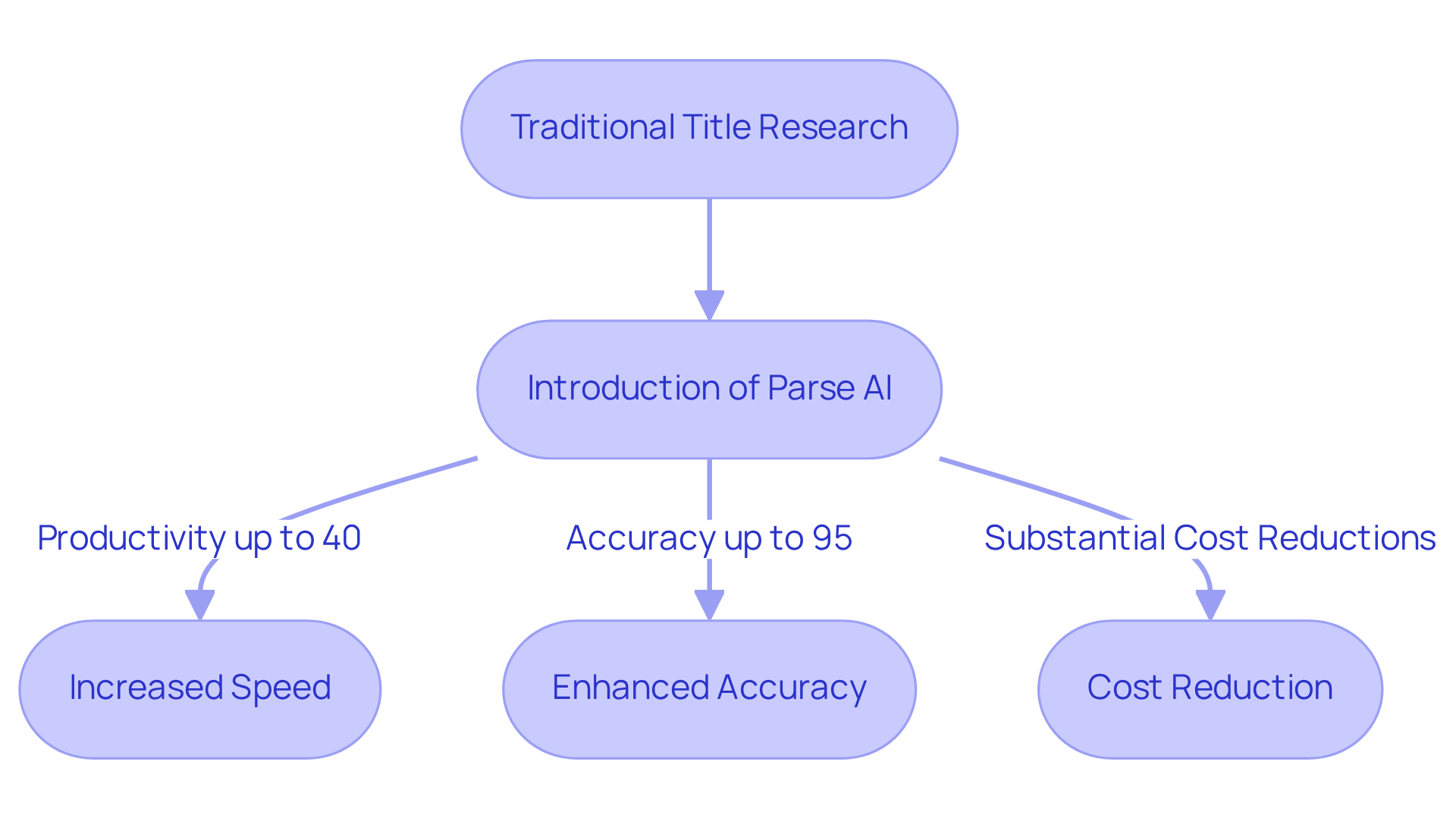
Zillow: Enhancing Property Search and Valuation with AI
Zillow has revolutionized its platform by integrating AI, significantly enhancing the . By leveraging advanced machine learning algorithms, Zillow delivers more accurate home value assessments and tailored real estate recommendations. This innovation enriches the user experience and empowers buyers and sellers to make informed decisions based on real-time data and evolving market trends.
In 2024, machine learning captured 44% of the AI housing market share, with search and discovery of listings accounting for 31.8% of this market. This statistic underscores the crucial role of AI in real estate marketing by facilitating smarter decision-making through data analysis and trend forecasting.
Furthermore, Zillow's AI features, including the neural Zestimate valuation, have been pivotal in improving home value estimation precision, achieving an impressive 63% accuracy rate in valuations, as reported by the MIT Center for Real Estate. Consequently, users enjoy a more streamlined and effective home search experience, with AI tools driving personalized recommendations that can enhance conversion rates by up to 30%.
This shift towards AI-driven solutions highlights the role of AI in real estate marketing, reflecting a broader trend in the industry where firms increasingly acknowledge the potential of technology to boost operational efficiency and customer satisfaction. It is also essential to emphasize the importance of responsible AI design to mitigate biases, ensuring that these advancements equitably benefit all users.
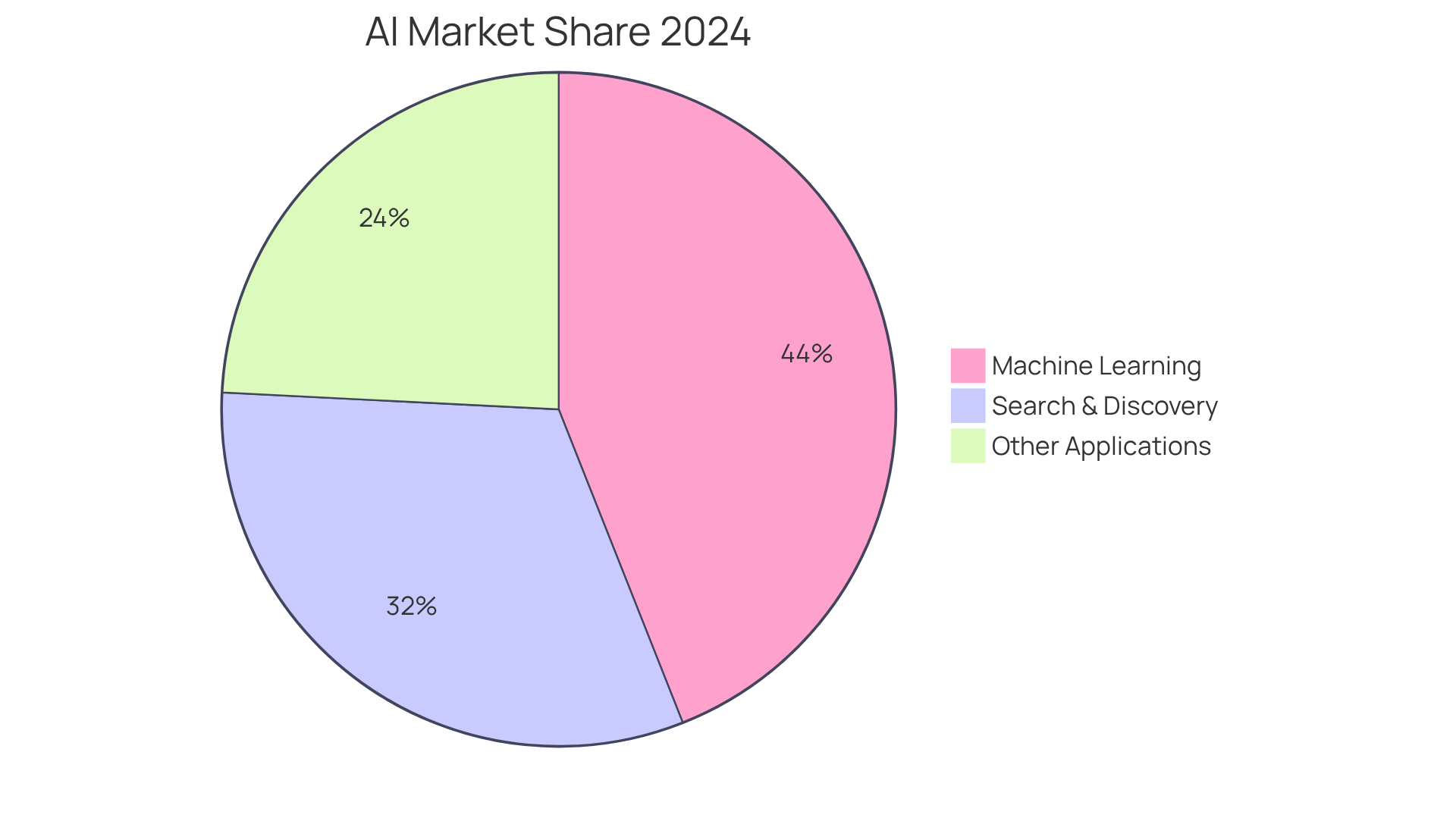
Matterport: Creating Immersive Virtual Tours for Enhanced Marketing
Matterport has fundamentally transformed real estate marketing through its immersive 3D virtual tours, allowing prospective buyers to explore listings from the comfort of their homes. These tours offer a realistic sense of space and layout, significantly enhancing the buyer's experience.
Furthermore, by leveraging AI, Matterport elevates the quality of these virtual tours, showcasing the role of AI in real estate marketing to make them not only more engaging but also more informative. This innovation has demonstrably increased engagement metrics, with listings featuring and selling approximately 31% faster than traditional listings.
Case studies reveal that properties with virtual tours often lead to smoother sales processes, as buyers can filter out unsuitable options before in-person visits, resulting in fewer surprises and higher satisfaction.
The incorporation of AI in virtual tours showcases the role of AI in real estate marketing, as it is not merely a technological advancement but also a strategic initiative that enhances conversion rates and positions property listings more competitively in the market.
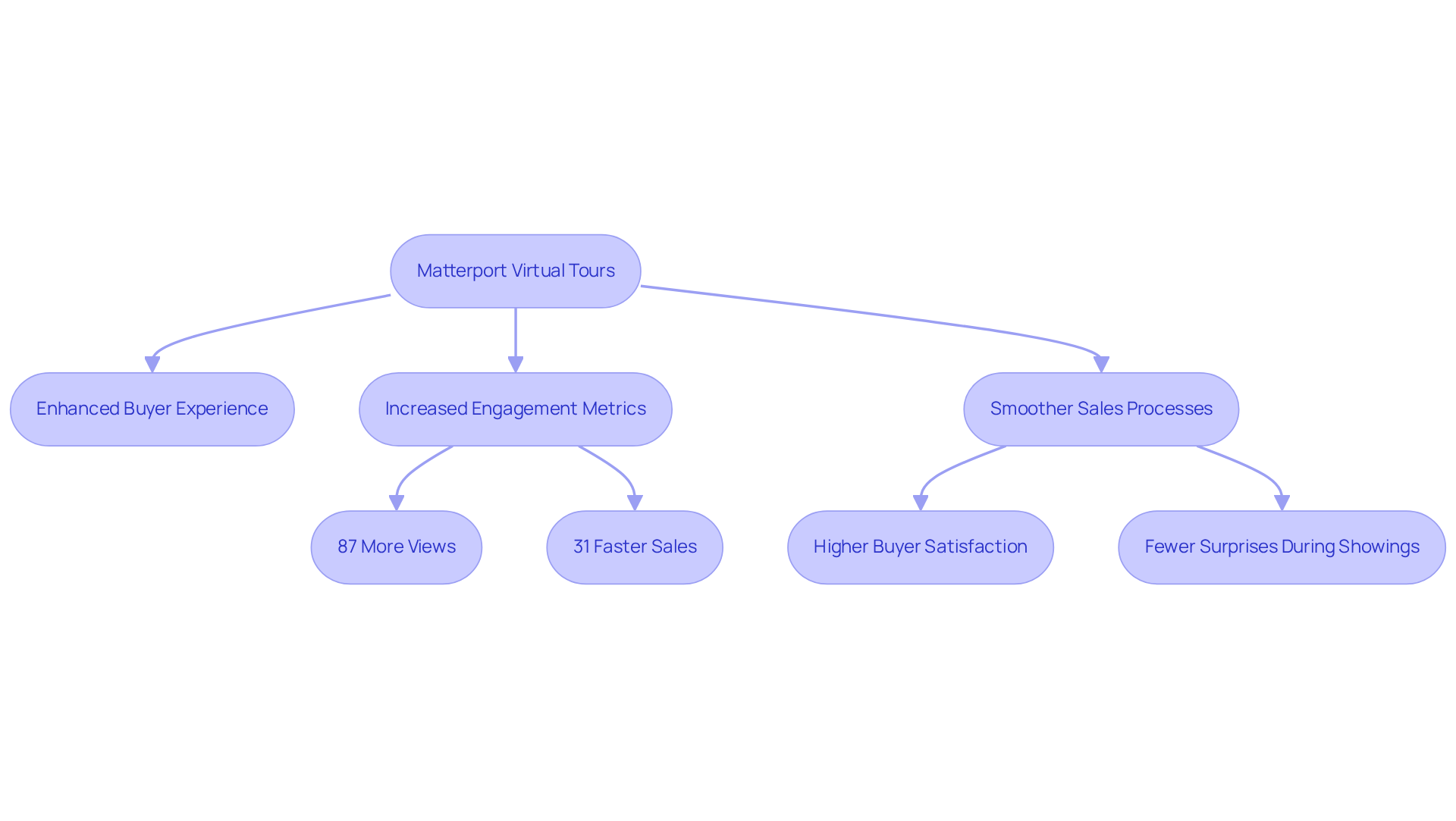
Colibri Real Estate: Streamlining Operations with AI Tools
Colibri Real Estate harnesses AI tools, notably advanced machine learning solutions from Parse AI, to optimize a variety of operational processes, significantly enhancing the role of AI in real estate marketing and client management. By automating routine tasks such as document processing and title research, agents can devote more time to nurturing relationships and closing deals.
Parse AI's platform facilitates rapid annotation and extraction of information from unstructured documents, potentially reducing document processing time by up to 90%. This integration of AI not only elevates productivity but also , enabling agents to respond to client needs with increased efficiency.
For example, businesses employing AI for lead scoring experience a 30% boost in sales productivity, while those utilizing AI-driven dynamic pricing models achieve revenue growth of 5-10%. Furthermore, automation through Parse AI can streamline runsheet creation and improve courthouse document processing with features like full-text search and machine learning extraction, resulting in quicker closings and heightened client satisfaction.
As nearly 80% of agents embrace AI tools, the role of AI in real estate marketing is transforming the landscape, empowering professionals to work smarter and deliver exceptional service.
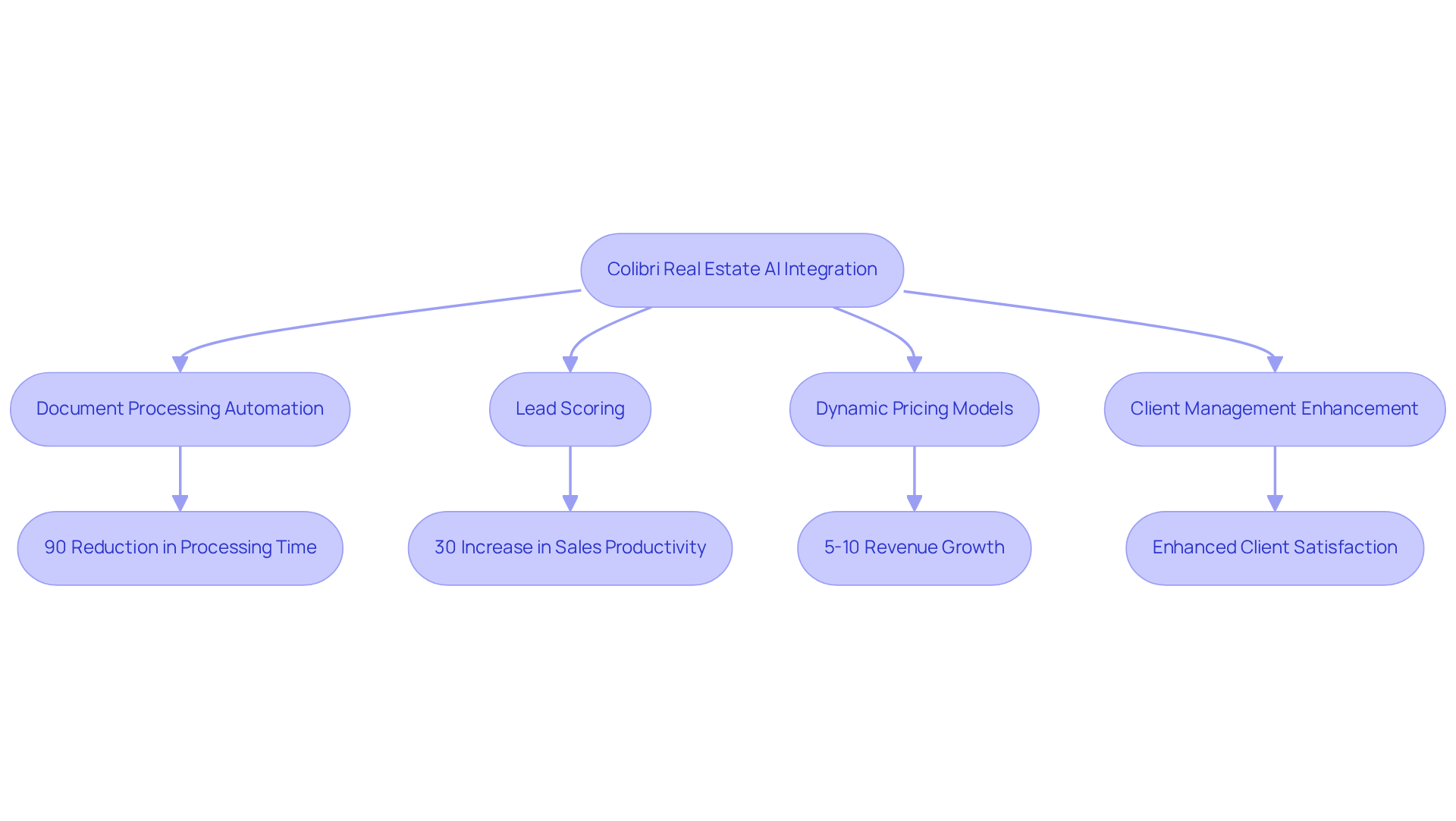
JLL: Utilizing AI for Market Analysis and Property Management
JLL harnesses the power of AI to revolutionize its market analysis and management processes, showcasing the role of AI in real estate marketing. By leveraging extensive data analytics, JLL identifies emerging market trends, accurately assesses asset values, and refines management strategies. This not only enhances decision-making but also maximizes the value of property investments.
For example, AI has demonstrated the ability to improve operational efficiency, potentially boosting net cash flow by over 10%. Furthermore, brokers and services may experience a remarkable 34% increase in operating cash flow through automation, underscoring the broader potential of AI within the industry.
JLL's commitment to the role of AI in real estate marketing has resulted in significant advancements in property management optimization. Case studies reveal that firms employing AI tools, such as Royal London Asset Management, achieved a record ROI of 708% alongside substantial energy savings.
As the property landscape evolves, JLL's innovative application demonstrates the role of AI in real estate marketing, positioning it at the forefront of industry transformation and ensuring clients reap the benefits of actionable insights and enhanced investment outcomes.
However, it is crucial to address the potential job displacement concerns associated with AI, a significant topic of discussion within the industry. JLL's methodology highlights technology fueled by property knowledge, facilitating intelligent space utilization and high ROI.
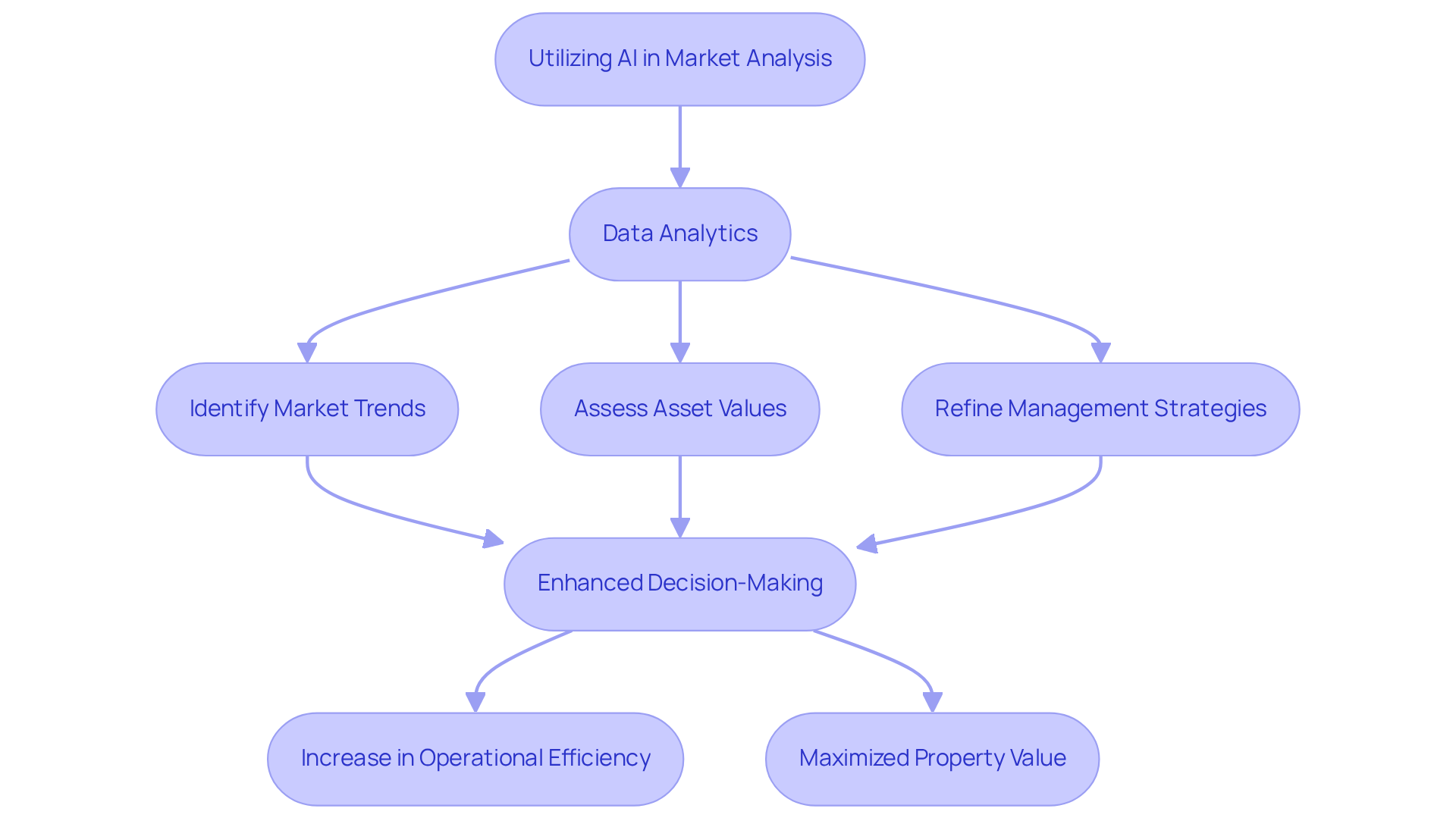
Blooma: AI Solutions for Optimizing Commercial Real Estate Marketing
Blooma harnesses the role of AI in real estate marketing to enhance promotional strategies in commercial real estate through predictive analytics. This technology facilitates the identification of potential leads and allows for the that resonate with specific audiences. Consequently, engagement levels rise, and the effectiveness of promotional campaigns significantly improves.
For instance, AI-driven market analysis tools can predict emerging trends with up to 90% accuracy, providing valuable insights that enhance decision-making. Furthermore, AI can forecast real estate price trends with 95% accuracy, assisting in more informed investment choices. Companies utilizing predictive analytics have reported a 33% increase in lead generation, showcasing the tangible benefits and the role of AI in real estate marketing.
Additionally, the role of AI in real estate marketing enhances searches with 25% greater engagement rates, further demonstrating its efficacy in improving promotional results. By focusing on targeted marketing, Blooma not only drives better results for commercial real estate professionals but also sets a precedent for the industry's future direction.
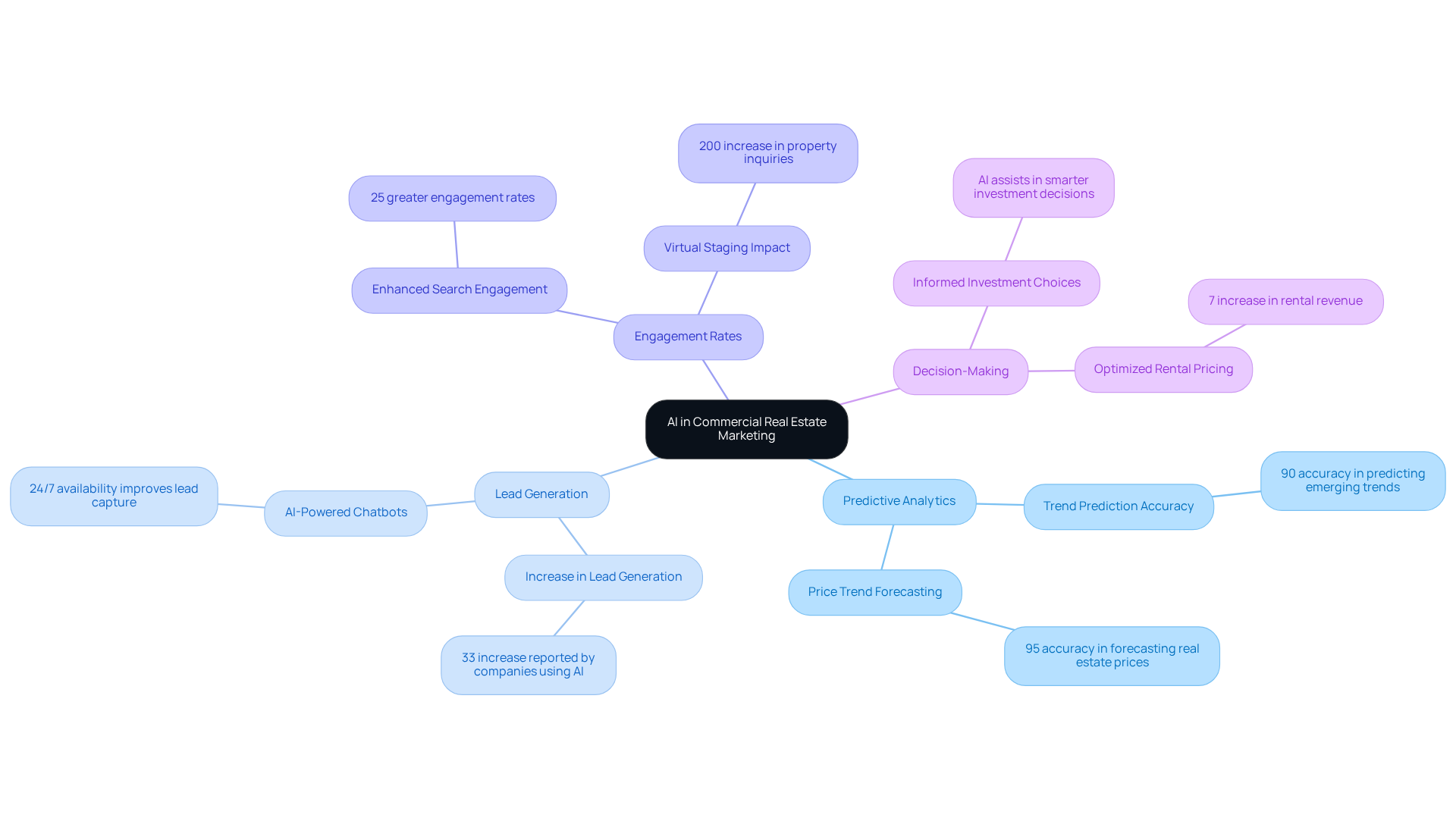
RealEstate.com: Personalizing Home-Buying Recommendations with AI
RealEstate.com showcases the role of AI in real estate marketing by offering personalized home-buying recommendations that align with user preferences and behaviors. By thoroughly analyzing data from user interactions, the platform identifies features that satisfy individual criteria, such as architectural style, budget, and lifestyle requirements. This tailored approach not only enhances user satisfaction but also significantly increases the likelihood of successful transactions.
In fact, AI-driven real estate management platforms have demonstrated the capacity to boost rental income by up to 9% and decrease maintenance costs by as much as 14%. Furthermore, AI can improve conversion rates by 30% through personalized listings and elevate engagement rates in searches by 25%. With the ability to accurately with 95% precision based on real-time data analysis, AI ensures that users receive relevant and timely information, fostering a more efficient home-buying experience.
Consequently, platforms such as RealEstate.com are transforming the landscape of property marketing by emphasizing the role of AI in real estate marketing, making the process more user-focused and efficient.
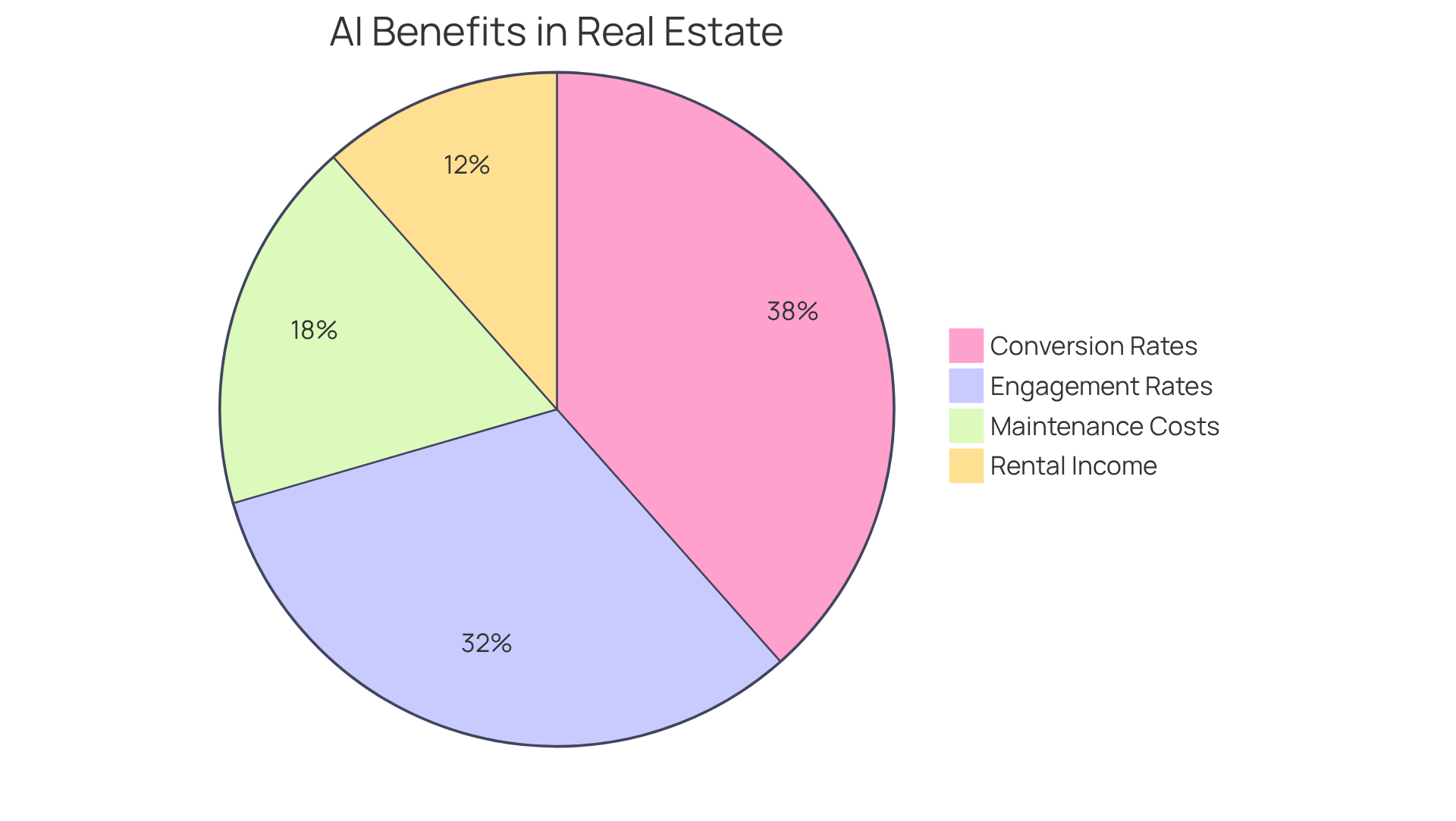
SolveIt: AI-Driven Insights for Real Estate App Development
AI technologies are fundamentally transforming property application development by providing essential insights that significantly enhance user experience. By harnessing data analytics, developers can accurately pinpoint user needs and preferences, leading to the creation of more intuitive and user-friendly applications. This emphasis on is crucial in a competitive environment, as it ensures that property applications not only satisfy but also anticipate the evolving needs of consumers.
For instance, in 2024, the search and discovery of assets accounted for 31.8% of the AI housing market, underscoring how advanced search tools and virtual tours considerably enhance the property search process. As Sanjeev Verma, CEO of Biz4Group, asserts, "AI is no longer just a tech trend — it's a strategic business imperative."
Consequently, as AI continues to shape the industry, its integration into app design will be pivotal for developers striving to deliver exceptional user experiences.
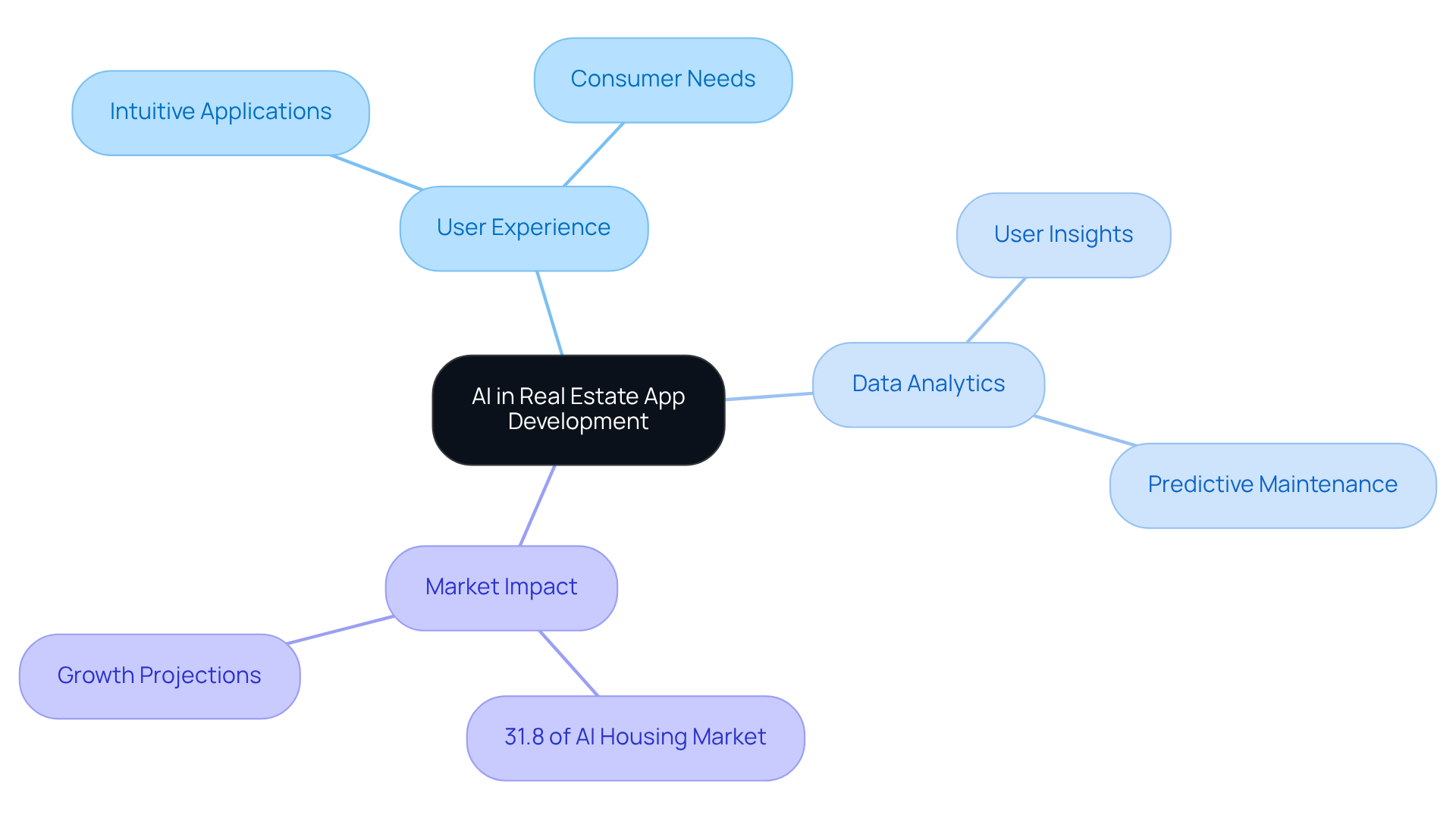
MindInventory: AI Solutions for Property Management and Fraud Detection
AI solutions are revolutionizing asset management and fraud detection within the housing market. By harnessing advanced machine learning algorithms, companies can continuously monitor transactions for suspicious activities, significantly mitigating the risk of fraud. Real-time fraud detection systems, for example, can identify anomalies in milliseconds—a crucial advantage, especially considering that only 27% of businesses can detect fraud in real time. This proactive approach stands in stark contrast to , which often uncover fraud only after it has occurred.
Furthermore, AI-driven asset management tools enhance operational efficiency by automating routine tasks such as rent collection and maintenance forecasts. Approximately 70% of property management companies now employ AI for predictive maintenance, allowing them to address issues before they escalate. This not only improves tenant satisfaction but also reduces costs. As Mehul Rajput, CEO of MindInventory, aptly states, "AI and ML aren’t just add-ons—they are redefining how software is imagined, built, and used."
As the property market evolves, the role of AI in real estate marketing becomes essential for maintaining a competitive edge and ensuring seamless operations. MindInventory's extensive experience, evidenced by the completion of over 2500 projects and the delivery of more than 20 enterprise-grade software products, underscores its commitment to innovation in this sector.
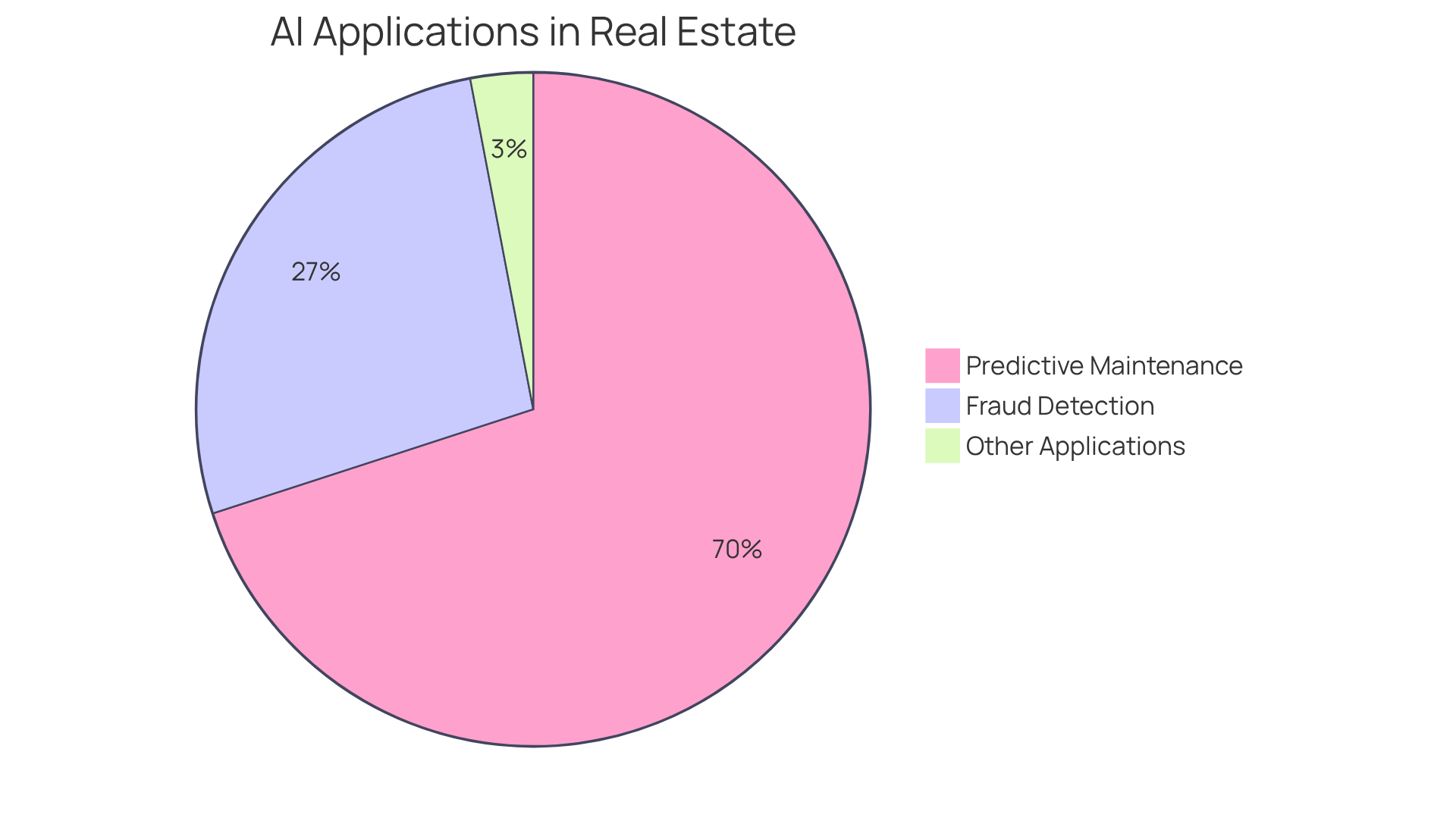
US News: Analyzing the Impact of AI-Driven Platforms on Real Estate Marketing
The impact of AI-driven platforms on property promotion is profound, as underscored by recent analyses. These technologies are increasingly relied upon for data examination, customer interaction, and targeted promotional strategies, fundamentally transforming how property professionals engage with clients. For instance, companies like Compass have reported an impressive 107% increase in engagement and a 153% boost in homepage click-through rates following the implementation of AI-powered recommendations. Similarly, Cushman & Wakefield saved 550 hours per month through automated data capture, illustrating the operational efficiencies that AI can deliver. Significantly, the property sector could realize $34 billion in efficiency improvements by 2030, highlighting the financial advantages of AI adoption.
As AI continues to advance, the role of AI in real estate marketing is expected to expand, creating new opportunities for professionals to enhance their marketing initiatives. The global AI real estate market, valued at USD 2.9 billion in 2024, is , reaching USD 41.5 billion by 2033. This growth illustrates the industry's increasing reliance on AI-driven tools for asset management and market analysis.
Moreover, AI-driven platforms are not only streamlining processes but also enhancing customer experiences. For instance, predictive analytics can assist managers in anticipating tenant behavior, thereby lowering turnover rates and improving retention strategies. Furthermore, predictive analytics can contribute to reducing energy consumption by up to 20%, highlighting AI's diverse advantages in property management. With AI's capability to personalize property searches based on user feedback, clients are enjoying more efficient and tailored interactions.
In summary, the role of AI in real estate marketing is reshaping the landscape, enabling professionals to leverage data-driven insights for improved decision-making and enhanced client engagement. However, challenges such as high initial costs and data privacy concerns must also be addressed as the industry adapts to these technologies.
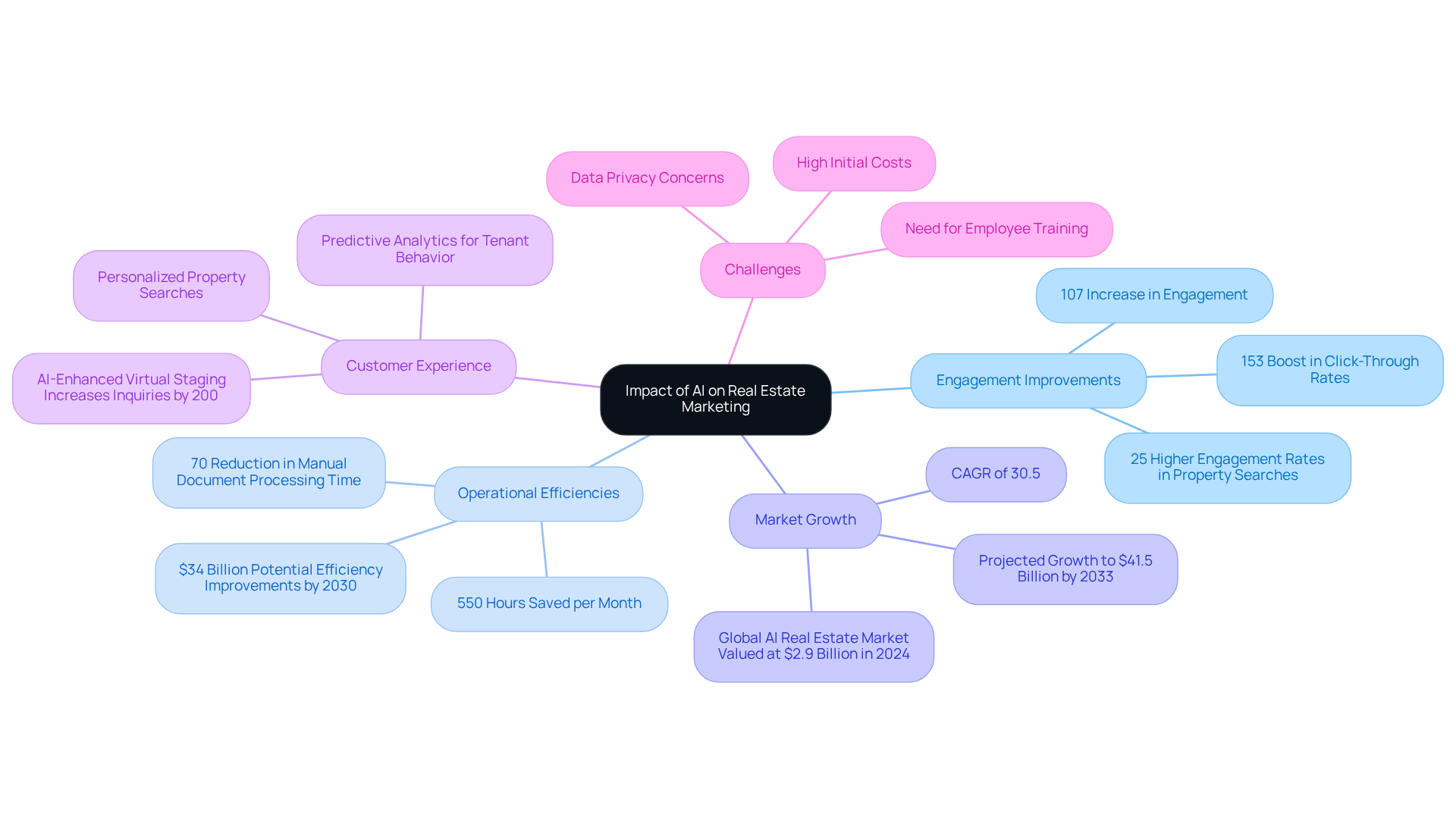
Conclusion
The integration of artificial intelligence in real estate marketing is reshaping the industry landscape, offering innovative solutions that enhance efficiency, accuracy, and customer engagement. By leveraging advanced technologies such as machine learning and data analytics, real estate professionals can optimize operations, streamline processes, and ultimately deliver a superior experience to clients. This transformation not only modernizes traditional practices but also positions companies at the forefront of a rapidly evolving market.
Key insights from the article highlight how various companies are harnessing AI to revolutionize specific aspects of real estate marketing:
- Parse AI's document processing that drastically reduces research time
- Zillow's personalized property recommendations that improve user satisfaction
- Matterport's immersive virtual tours that boost engagement
Each example illustrates the profound impact AI has on enhancing operational effectiveness. Furthermore, organizations like JLL and Colibri Real Estate demonstrate the potential for AI to drive significant financial benefits and improve decision-making through data-driven insights.
As the real estate industry continues to embrace AI technologies, the imperative for professionals to adapt and innovate becomes increasingly clear. Embracing these advancements not only ensures competitive advantage but also paves the way for a more efficient, customer-centric approach to real estate marketing. The future of the industry lies in the hands of those willing to leverage AI's capabilities, fostering an environment where both clients and professionals can thrive.
Frequently Asked Questions
What is Parse AI and how does it benefit title research?
Parse AI uses machine learning and optical character recognition to quickly extract essential information from title documents, enabling title researchers to produce abstracts and reports faster and more accurately. This innovation enhances workflow efficiency and reduces costs compared to traditional methods.
What productivity improvements have companies experienced by using AI-driven solutions like Parse AI?
Companies utilizing AI-driven solutions have reported productivity enhancements of up to 40%, benefiting property professionals in optimizing their operations.
How accurate are the algorithms used in Parse AI for document processing?
Some algorithms in Parse AI have achieved up to 95% accuracy in critical tasks, significantly improving the accuracy of document processing.
How has Zillow integrated AI into its platform?
Zillow has integrated AI to enhance its real estate search and valuation processes, providing more accurate home value assessments and personalized real estate recommendations based on real-time data and market trends.
What market share did machine learning capture in the AI housing market in 2024?
In 2024, machine learning captured 44% of the AI housing market share, with search and discovery of listings accounting for 31.8% of this market.
What is the accuracy rate of Zillow's neural Zestimate valuation?
Zillow's neural Zestimate valuation has achieved an impressive accuracy rate of 63% in home value estimations, according to the MIT Center for Real Estate.
How do AI features on Zillow enhance the user experience?
AI features on Zillow provide tailored recommendations and improve home value estimation precision, allowing buyers and sellers to make informed decisions and enhancing the overall user experience.
What impact do Matterport's 3D virtual tours have on real estate marketing?
Matterport's 3D virtual tours significantly enhance real estate marketing by allowing buyers to explore listings virtually, leading to increased engagement metrics, with listings featuring 3D tours receiving 87% more views and selling approximately 31% faster.
How does AI improve the quality of virtual tours provided by Matterport?
AI elevates the quality of Matterport's virtual tours, making them more engaging and informative, which helps buyers filter out unsuitable options before in-person visits, resulting in smoother sales processes.
What is the strategic significance of incorporating AI in real estate marketing?
The incorporation of AI in real estate marketing enhances conversion rates and positions property listings more competitively in the market, reflecting a broader trend towards technology adoption in the industry.




